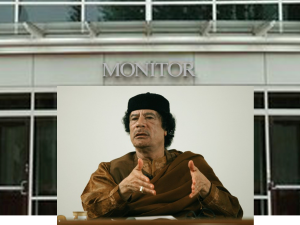As an international coalition bombards Libya, it’s important to gauge the power of another blitz carried out by a very different, elite international coalition: the propaganda blitz conducted by the Harvard-powered consulting firm Monitor Group, using illustrious academics and public intellectuals from both sides of the Atlantic to burnish Libya’s image.
The Monitor Group — ostensibly working to liberalize Libya — was also reportedly paid handsomely by Libya to carry out a Gaddafi PR campaign, sending these so-called “thought leaders” to Libya to lend their notorious client prestige. Gaddafi benefited from the credibility the academics brought with them, the articles some of them wrote upon returning from Libya, and debriefs some allegedly gave to government officials. Monitor Group, according to Politico, is not registered as a lobbyist for Libya.
The campaign helps explain why Libya’s image softened in recent years. And it also underscores the emergence of a new breed of power broker: “shadow lobbyists” who have come to pervade everything from foreign policy and national security to financial regulation and health care reform. These unregistered agents of influence, unconstrained by lobbying laws, can be more potent than traditional lobbyists. And they can more easily escape notice, as did the Monitor Group, weaving their way through global networks and creating a loop that is all but closed to democratic input and monitoring.
Shadow lobbyists who trade on the reputation of the impartial scholar can be especially effective and insidious, because, ironically, it is the image of the neutral, incorruptible intellectual that is being bought and sold. And Libya is just the latest example of academics contracted to act as shadow lobbyists (or by shadow lobbyists) on behalf of companies, governments or, in this case, a dictatorship.
Recently, academic economists were forced to address whether to adopt a code of ethics. Researchers at the University of Massachusetts-Amherst put out a report last fall which found that out of nineteen prominent academic economists who gave “expert” advice to the media and public about financial reform, the “vast majority of the time, [they] did not identify [corporate] affiliations and possible conflicts of interest.” Their discipline was also rocked by the story of two high-profile economists paid to assess Iceland’s economy shortly before the banks there collapsed. Their findings were predictably positive and spectacularly wrong.
And last summer, the New York Times examined what it called the “Academic-Industrial Complex”, namely, the vast numbers of university presidents serving on corporate boards. Corporations use these appointments to enhance their prestige, the presidents themselves get enviable perks and handsome outside pay, but what do the shareholders get? Often, the Times reports, these campus figures don’t have the needed financial expertise and are even sought after because of that: they might be less likely to ask the hard questions, ones that, by the way, seemingly didn’t get asked by corporate boards in the run-up to the 2008 economic collapse.
Which brings us back to the academics who traveled to Libya. One in particular, political theorist and democracy advocate Benjamin Barber, a Professor Emeritus at Rutgers, wrote a positive piece in the Washington Post in 2007 about his visit with Gaddafi. The article did not mention that he had been paid by the Monitor Group. Barber has come out swinging in his own defense and (presumably unintentionally) offers some credence to critics of freelancing intellectuals. In one interview with Foreign Policy, he ponders the “old question that goes back to Machiavelli…” of whether thinkers should engage with power: “My answer is that each person has to make their own decision.”
In another defense to The Nation, he insists that he was genuinely interested in fostering democracy in Libya, and was never swayed by money, or told to write anything at Monitor’s behest, adding: “… it is not who pays you that is important, but whether they are paying you to do what you do, or you are doing what they want you to do because they are paying you.”
He also suggests that if you have a longtime reputation for integrity, you should be trusted to monitor yourself. But does self-regulation cut it? A more concrete code of conduct is needed when money and influence are involved, not just to root out the corrupt, but, indeed, to protect the integrity of the well-intentioned, as Barber says he is.
A basic standard of conduct would call on academics to use their well-honed powers of critical thinking when presented with financial or professional opportunities, especially when they come connected to notorious sources like Libya. And universities hungry for cash should be wary as well: Barber rightly points out that if a handful of scholars get scrutinized for this incident, then so should the prestigious academic institutions taking huge amounts of money from Saudi royals who might seek to promote strict Wahabi Islam.
Tellingly, the most full-throated expression of regret in the Libya mess has come from, of all places, Mariah Carey, who apologized profusely for performing at a Gaddafi family event. She pronounced herself “naive”, “embarrassed”, adding: “…this is a lesson for all artists…We need to be more aware and take more responsibility regardless of who books our shows. Ultimately, we as artists are to be held accountable.”
And yet top intellectuals have engaged in rhetorical jujitsu to explain their (presumably inadvertent) role in a propaganda program far more weighty to world affairs than a one-night celebrity concert.
Clearly the new stealth lobbyists at Monitor Group were pursuing their own interests, even as they were purportedly operating in the public interest. Monitor tried to bill its efforts as simply an attempt to bring Western reform to Libya, but the documents show otherwise. Now, as we see innocent Libyans pressing for democracy executed, and American forces at risk, those who tried to engineer Gaddafi’s comeback campaign need to own up to their supporting role.
By Janine Wedel and Linda Keenan
Published in The Huffington Post, March 24, 2011.

